高职高专英语课程教学大纲
《高职高专英语》教学大纲.
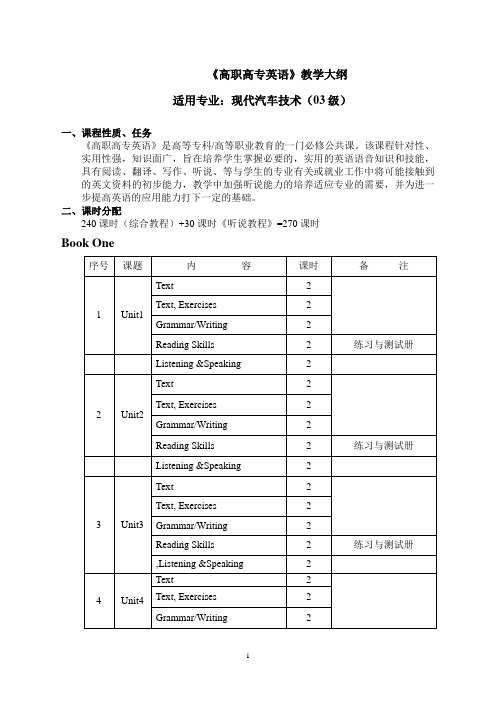
《高职高专英语》教学大纲适用专业:现代汽车技术(03级)一、课程性质、任务《高职高专英语》是高等专科/高等职业教育的一门必修公共课。
该课程针对性、实用性强,知识面广,旨在培养学生掌握必要的,实用的英语语音知识和技能,具有阅读、翻译、写作、听说、等与学生的专业有关或就业工作中将可能接触到的英文资料的初步能力,教学中加强听说能力的培养适应专业的需要,并为进一步提高英语的应用能力打下一定的基础。
二、课时分配240课时(综合教程)+30课时《听说教程》=270课时Book One三、课程教学内容(Book 1)Unit One重点:●课文——Why College?●阅读——Passage One-Two●语法——Article●写作——Form-filling●练习——Exercises for Unit One●听说——Unit One难点:●V ocabulary●StructureUnit Two重点:●课文——Who’s Afraid of Maths Anyway?●阅读——Passage One-Two●语法——Plural From●写作——Business Cards●练习——Exercises for Unit Two●听说——Unit Two难点:●V ocabulary●StructureUnit Three重点:●课文——Paradise Lost?●阅读——Passage One-Two●语法——Word-building●写作——Layout of Business Letters●练习——Exercises for Unit Three●听说——Unit Three难点:●V ocabulary●StructureUnit Four重点:●课文——Moving From Detroit to Hobbs●阅读——Passage One-Two●语法——Passive V oice●写作——Addressing Envelops●听说——Unit Four难点:●V ocabulary●StructureUnit Five重点:●课文——Winning at All Costs●阅读——Passage One-Two●语法——Comparative Forms●写作——Fax●练习——Exercises for Unit Five●听说——Unit Five难点:●V ocabulary●StructureUnit Six重点:●课文——Why Are We Addicted to Soaps●阅读——Passage One-Two●语法——Pronoun●写作——Memo●练习——Exercises for Unit Six●听说——Unit Six难点:●V ocabulary●StructureUnit Seven重点:●课文——The Richest Man in the World●阅读——Passage One-Two●语法——Numeral●写作——Letters of Invitation●练习——Exercises for Unit Seven●听说——Unit Seven难点:●V ocabulary●StructureUnit Eight重点:●课文——This Generation Means Business●阅读——Passage One-Two●语法——Tag Question●写作——Cover Letter●听说——Unit Eight难点:●V ocabulary●StructureUnit Nine重点:●课文——Waterloo Bridge●阅读——Passage One-Two●语法——Emphatic Structure●写作——Resume●练习——Exercises for Unit Nine●听说——Unit Nine难点:●V ocabulary●StructureUnit Ten重点:●课文——Going the Distance●阅读——Passage One-Two●语法——Preposition●写作——Poster●练习——Exercises for Unit Ten●听说——Unit Ten难点:●V ocabulary●Structure●应用能力考试模拟试卷Book Two课程教学内容(Book 2)Unit One重点:●课文—Patriotism●阅读——Passage One-Two●语法——Attributive Clause(1)●写作——E-mail●练习——Exercises for Unit One●听说——Unit One难点:●V ocabulary●StructureUnit Two重点:●课文——Capital Cities●阅读——Passage One-Two●语法——Attributive Clause(2)●写作——Notice●练习——Exercises for Unit Two●听说——Unit Two●V ocabulary●StructureUnit Three重点:●课文——With What Do You Buy Your Money●阅读——Passage One-Two●语法——Attributive Clause(3)●写作——Letters of Thanks●练习——Exercises for Unit Three●听说——Unit Three难点:●V ocabulary●StructureUnit Four重点:●课文——Some Photographs Make History●阅读——Passage One-Two●语法——Adverbial Clause of Time●写作——Letters of Apology●练习——Exercises for Unit Four●听说——Unit Four难点:●V ocabulary●StructureUnit Five重点:●课文——Dilemma for Science●阅读——Passage One-Two●语法——Adverbial Clause of Condition●写作——Letters of Congratulation●练习——Exercises for Unit Five●听说——Unit Five难点:●V ocabulary●StructureUnit Six重点:●课文——Journeys That Change History●阅读——Passage One-Two●语法——Adverbial Clause of Reason●写作——Hotel Reservations●练习——Exercises for Unit Six●听说——Unit Six●V ocabulary●StructureUnit Seven重点:●课文——America’s Vision for a Digital Future●阅读——Passage One-Two●语法——Adverbial Clause of Concession●写作——Complaining●练习——Exercises for Unit Seven●听说——Unit Seven难点:●V ocabulary●StructureUnit Eight重点:●课文——The Chinese Bowl●阅读——Passage One-Two●语法——Adverbial Clause of Purpose and Result●写作——Replying to Complaints●练习——Exercises for Unit Eight●听说——Unit Eight难点:●V ocabulary●StructureUnit Nine重点:●课文——The Amoco Cadiz●阅读——Passage One-Two●语法——Subjunctive Mood(1)●写作——Letters of Inquiring●练习——Exercises for Unit Nine●听说——Unit Nine难点:●V ocabulary●StructureUnit Ten重点:●课文——Your Dream Job: A Click Away●阅读——Passage One-Two●语法——Subjunctive Mood(2)●写作——Letters of Recommendation●练习——Exercises for Unit Ten●听说——Unit Ten●V ocabulary●Structure●应用能力考试模拟试卷课程教学内容(Book 3)Unit One重点:●课文——Redefine the Image and Value of Beauty●阅读——Passage One-Two●语法——Infinitive●写作——Product Manual●练习——Exercises for Unit One●听说——Unit One难点:●V ocabulary●StructureUnit Two重点:●课文——The Internet●阅读——Passage One-Two●语法——Gerund●写作——Visa Application Form●练习——Exercises for Unit Two●听说——Unit Two难点:●V ocabulary●StructureUnit Three重点:●课文——Work●阅读——Passage One-Two●语法——Agreement Between Subject and Verb●写作——Contacts or Agreements●练习——Exercises for Unit Three●听说——Unit Three难点:●V ocabulary●StructureUnit Four重点:●课文——Chinese Art and Architecture●阅读——Passage One-Two●语法——Need and Dare●写作——Online Booking and Registration●练习——Exercises for Unit Four●听说——Unit Four难点:●V ocabulary●Structure四、课程教学的基本要求课程的主要目标是通过大量的语言实践活动,掌握和巩固必要的词汇、语法、句型,培养学生的语言表达能力和语感素养,最后提高学生的英语应用能力,通过高等学校英语应用能力考试。
高职高专英语教学大纲

高职高专英语教学大纲学时:212 学分:13.5层次:统招专科适用专业:统招各专业第一部分大纲说明一、课程的性质、目的和任务性质:本大纲适用于参加普通高考入学的非英语专业的学生。
学生入学时一般掌握基本的英语语音知识和语法知识,认识英语单词1,600个,在听、说、读、写、译等方面受过初步的训练。
目的及任务:本课程的教学目的是经过220左右学时的教学,使学生掌握一定的英语知识和技能,具有一定的听、说、读、写、译的能力,从而能借助词典阅读和翻译有关英语业务资料,在涉外交涉的日常活动和业务活动中进行简单的口头和书面交流,并为今后进一步提高英语的交际能力打下基础。
二、课程的基本要求本课程在加强英语语言基础知识和基本技能训练的同时,重视培养学生实际使用英语进行交际的能力。
通过本课程的学习,学生应该达到以下要求:1、词汇:认识3400个英语单词(包括入学时要求掌握的1600个单词)以及由这些单词构成的常用词组,对其中2000个左右的单词能正确拼写,英汉互译。
学生还应结合专业英语学习,认识400个专业英语词汇。
2、语法:掌握基本的英语语法规则,在听、说、读、写、译方面能正确运用所学语法知识。
3、听力:能听懂日常和涉外业务中使用的结构简单、发音清楚、语速较慢(每分钟词左右)的英语对话和不太复杂的陈述,理解基本正确。
4、口语:能用英语进行一般的课堂交流,并能在日常和涉外业务活动中进行简单的交流。
5、阅读:能阅读中等难度的一般题材的简短英文资料,理解正确。
在阅读生词不超过总词数3%的英文资料时,阅读速度不低于每分钟70词。
能读懂通用的简短实用文字材料的信函、技术说明书、合同等、理解正确。
6、写作:能就一般性题材,在30分钟内写出80-100词的命题作文,能填写和模拟套鞋短语的英语应用文,如填写表格与单证,套鞋简历、通知、信函等,文句基本正确,无重大语法错误,格式基本恰当,表达清楚。
7、翻译:能借助词典讲中等难度的一般题材的文字材料和对外交往中的一般业务文字材料译成汉语,译文达意,格式恰当。
高职英语教学大纲(新)

高职英语教学大纲(新)高职英语教学大纲一、课程性质高职英语课程是一门必修的公共基础课,是高等职业教育的一个有机组成部分。
高职英语课程是以培养面向生产、服务和管理第一线需要的高技能人才为目标,不仅要帮助学生打好语言基础,更要注重培养学生实际应用语言的技能,特别是用英语处理与未来职业相关业务的能力。
二、课程目标高职英语课程以职场交际为目标,以应用为目的,培养学生实际应用英语的能力,特别是听说能力。
通过对学生听、说、读、写、译能力的培养,使他们能够借助词典阅读和翻译资料,并能够在日常活动和与未来职业相关的业务活动中进行一般的口头和书面交流;同时掌握有效的学习方法,增强自主学习能力,为他们提升就业竞争力及今后的可持续发展打下良好的基础。
同时作为一种人文启蒙课程,在教学中渗透人文知识内容,加强学生思想道德教育,提高学生的综合人文素质。
三、课程教学基本要求高职英语课程在加强英语语言基础知识和基本技能训练的同时,应贯彻“以实用为主,以应用为目的”原则,重视培养学生实际应用英语进行交际的能力。
通过对英语课程的学习,学生应达到如下要求:1.词汇:掌握3000个英语单词(含在中学阶段已经掌握的词汇)以及由这些词构成的常用词组,对其中1500个积极词汇能在口头和书面表达时加以运用。
另需掌握200个与行业相关的英语词汇。
2.语法:掌握基本的英语语法,并能基本正确地加以运用。
3.听力理解:听懂日常和涉外业务中使用的结构简单、发音清楚、语速较慢(每分钟120词左右)的英语材料,并正确理解。
4.口头表达:能就日常话题和与未来职业相关的话题进行简单的交谈。
5.阅读理解:能基本读懂一般题材及与未来职业相关的浅易英文资料,理解基本正确。
在阅读生词不超过总词数3%的英文资料时,阅读速度不低于每分钟50词。
能读懂常见的简短应用文,如信函、通知、图表及简单的使用说明等。
6.书面表达:能就一般性话题在30分钟内写出80词左右的命题作文,能填写和模拟套写常见的简短英语应用文,如表格、简历、通知、信函等。
高职高专实用英语课程大纲(视听说)
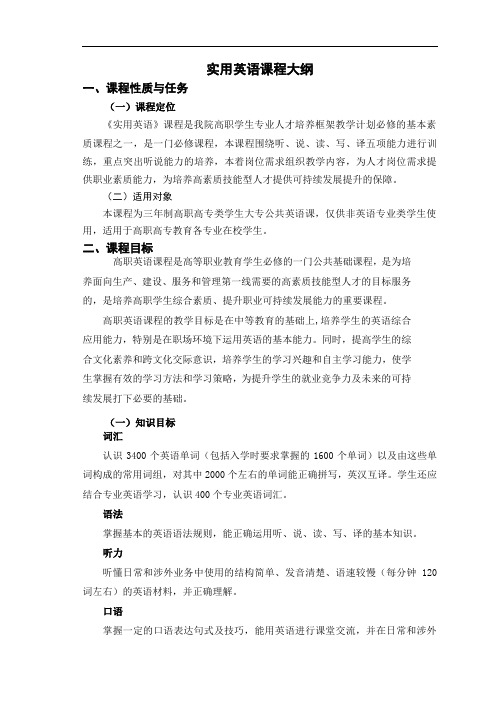
实用英语课程大纲一、课程性质与任务(一)课程定位《实用英语》课程是我院高职学生专业人才培养框架教学计划必修的基本素质课程之一,是一门必修课程,本课程围绕听、说、读、写、译五项能力进行训练,重点突出听说能力的培养,本着岗位需求组织教学内容,为人才岗位需求提供职业素质能力,为培养高素质技能型人才提供可持续发展提升的保障。
(二)适用对象本课程为三年制高职高专类学生大专公共英语课,仅供非英语专业类学生使用,适用于高职高专教育各专业在校学生。
二、课程目标高职英语课程是高等职业教育学生必修的一门公共基础课程,是为培养面向生产、建设、服务和管理第一线需要的高素质技能型人才的目标服务的,是培养高职学生综合素质、提升职业可持续发展能力的重要课程。
高职英语课程的教学目标是在中等教育的基础上,培养学生的英语综合应用能力,特别是在职场环境下运用英语的基本能力。
同时,提高学生的综合文化素养和跨文化交际意识,培养学生的学习兴趣和自主学习能力,使学生掌握有效的学习方法和学习策略,为提升学生的就业竞争力及未来的可持续发展打下必要的基础。
(一)知识目标词汇认识3400个英语单词(包括入学时要求掌握的1600个单词)以及由这些单词构成的常用词组,对其中2000个左右的单词能正确拼写,英汉互译。
学生还应结合专业英语学习,认识400个专业英语词汇。
语法掌握基本的英语语法规则,能正确运用听、说、读、写、译的基本知识。
听力听懂日常和涉外业务中使用的结构简单、发音清楚、语速较慢(每分钟120词左右)的英语材料,并正确理解。
口语掌握一定的口语表达句式及技巧,能用英语进行课堂交流,并在日常和涉外业务活动中能够进行简单交流。
阅读能阅读一般题材英文资料,理解正确。
阅读速度不低于每分钟80词。
能读懂日常的信函、技术说明书、合同等、理解正确。
写作掌握一定的应用文写作的书写格式和基本技巧,能就一般性题材,半小时内写出约120个单词的作文,能够写作英语应用文,如填写表格与单证,简历、通知、信函等,文句基本正确,无严重的语法错误,格式恰当,表达清楚得体。
《高职英语》课程教学大纲
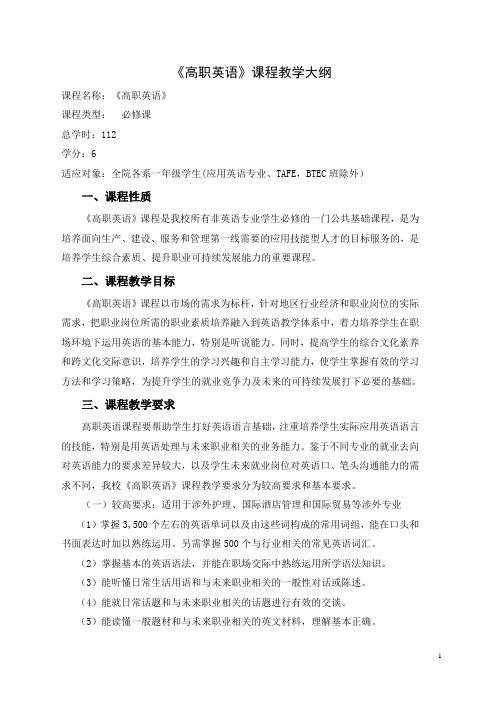
《高职英语》课程教学大纲课程名称:《高职英语》课程类型:必修课总学时:112学分:6适应对象:全院各系一年级学生(应用英语专业、TAFE,BTEC班除外)一、课程性质《高职英语》课程是我校所有非英语专业学生必修的一门公共基础课程,是为培养面向生产、建设、服务和管理第一线需要的应用技能型人才的目标服务的,是培养学生综合素质、提升职业可持续发展能力的重要课程。
二、课程教学目标《高职英语》课程以市场的需求为标杆,针对地区行业经济和职业岗位的实际需求,把职业岗位所需的职业素质培养融入到英语教学体系中,着力培养学生在职场环境下运用英语的基本能力,特别是听说能力。
同时,提高学生的综合文化素养和跨文化交际意识,培养学生的学习兴趣和自主学习能力,使学生掌握有效的学习方法和学习策略,为提升学生的就业竞争力及未来的可持续发展打下必要的基础。
三、课程教学要求高职英语课程要帮助学生打好英语语言基础,注重培养学生实际应用英语语言的技能,特别是用英语处理与未来职业相关的业务能力。
鉴于不同专业的就业去向对英语能力的要求差异较大,以及学生未来就业岗位对英语口、笔头沟通能力的需求不同,我校《高职英语》课程教学要求分为较高要求和基本要求。
(一)较高要求:适用于涉外护理、国际酒店管理和国际贸易等涉外专业(1)掌握3,500个左右的英语单词以及由这些词构成的常用词组,能在口头和书面表达时加以熟练运用。
另需掌握500个与行业相关的常见英语词汇。
(2)掌握基本的英语语法,并能在职场交际中熟练运用所学语法知识。
(3)能听懂日常生活用语和与未来职业相关的一般性对话或陈述。
(4)能就日常话题和与未来职业相关的话题进行有效的交谈。
(5)能读懂一般题材和与未来职业相关的英文材料,理解基本正确。
(6)能就一般性话题写命题作文,能模拟套写与未来职业相关的英语应用文,如信函、通知、个人简历等。
内容基本完整,表达基本准确,语义连贯,格式恰当。
(7)能借助词典将一般性题材的文字材料和与未来职业相关的业务材料译成汉语。
职高高三英语教学大纲(具体)
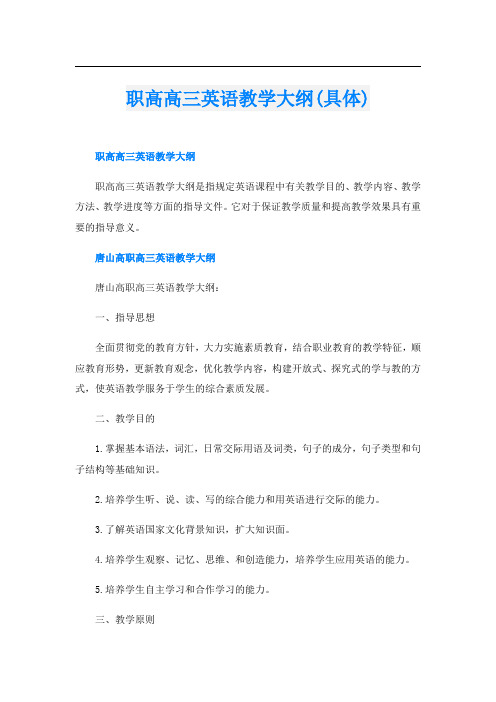
职高高三英语教学大纲(具体)职高高三英语教学大纲职高高三英语教学大纲是指规定英语课程中有关教学目的、教学内容、教学方法、教学进度等方面的指导文件。
它对于保证教学质量和提高教学效果具有重要的指导意义。
唐山高职高三英语教学大纲唐山高职高三英语教学大纲:一、指导思想全面贯彻党的教育方针,大力实施素质教育,结合职业教育的教学特征,顺应教育形势,更新教育观念,优化教学内容,构建开放式、探究式的学与教的方式,使英语教学服务于学生的综合素质发展。
二、教学目的1.掌握基本语法,词汇,日常交际用语及词类,句子的成分,句子类型和句子结构等基础知识。
2.培养学生听、说、读、写的综合能力和用英语进行交际的能力。
3.了解英语国家文化背景知识,扩大知识面。
4.培养学生观察、记忆、思维、和创造能力,培养学生应用英语的能力。
5.培养学生自主学习和合作学习的能力。
三、教学原则1.贯彻执行教育与教学相结合原则,遵守国家教育法规与政策。
2.面向全体学生,全面完成教学各项任务,全面提高学生素质。
3.发挥教学中学生的主体性,教师的主导性作用。
4.注重基础知识与基本技能的教学,正确处理知识、能力、素质之间的关系。
5.注重对学生学习策略的指导,重视培养学生为继续学习和终身发展所必须的能力,特别是创新精神和实践能力。
6.充分利用计算机和多媒体教学软件辅助教学,注意学科内各教学要素的横向、纵向联系与配合。
7.注意创设合理的外语学习环境,利用好课外学习资源,创造各种条件让学生有机会实践英语。
8.加强直观性教学,充分利用教具、学具、电教手段等,并积极利用多媒体、网络组织教学。
9.切实抓好基础教研,通过集体备课,相互观摩等活动,提高教师的业务素质和课堂教学水平。
10.优化课堂教学,提高课堂教学质量。
11.运用激励机制,多鼓励、多表扬。
关注困难学生,培养师生感情,建立良好的师生关系。
关注学困生,善于捕捉学生身上的闪光点,以此作为他们取得成绩的“兴奋点”,促使学困生平等参与课堂活动。
职高英语教学大纲
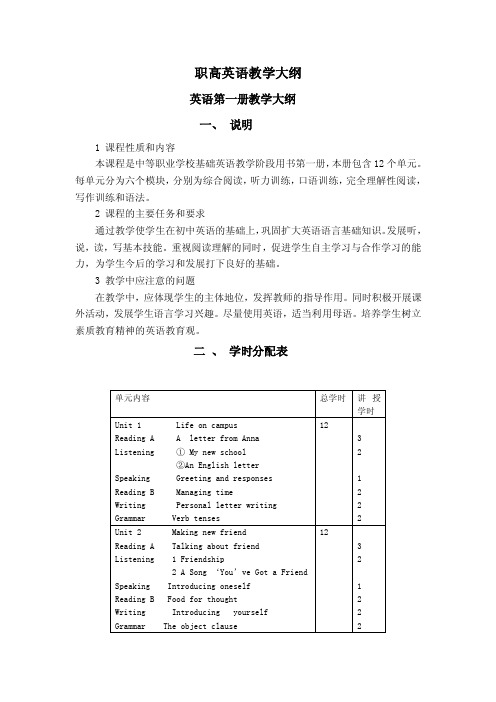
职高英语教学大纲英语第一册教学大纲一、说明1 课程性质和内容本课程是中等职业学校基础英语教学阶段用书第一册,本册包含12个单元。
每单元分为六个模块,分别为综合阅读,听力训练,口语训练,完全理解性阅读,写作训练和语法。
2 课程的主要任务和要求通过教学使学生在初中英语的基础上,巩固扩大英语语言基础知识。
发展听,说,读,写基本技能。
重视阅读理解的同时,促进学生自主学习与合作学习的能力,为学生今后的学习和发展打下良好的基础。
3 教学中应注意的问题在教学中,应体现学生的主体地位,发挥教师的指导作用。
同时积极开展课外活动,发展学生语言学习兴趣。
尽量使用英语,适当利用母语。
培养学生树立素质教育精神的英语教育观。
二、学时分配表三课程内容及安排Unit1 life on campus教学要求掌握hot words and use expressions的用法,能用简单的交际用语进行对话。
掌握非正式信函的格式应用,掌握常用的8种时态用法,提高学生听说读写的综合能力。
教学内容Reading A A letter from AnnaListening ① My new school②An English letterSpeaking Greeting and responsesReading B Managing timeWriting Personal letter writingGrammar Verb tensesUnit 2 Making new friend教学要求掌握hot words和useful expressions的用法。
巩固理解宾语从句的用法掌握用于自我介绍的基本日常用语,能写出自我介绍的短文在听力方面要求精听,培养学生集中精力捕捉相关细节信息的能力。
教学内容Reading A Talking about friendListening 1 Friendship2 A Song ‘You’ve Got a FriendSpeaking Introducing oneselfReading B Food for thoughtWriting Introducing yourselfGrammar The object clauseUnit3 Brave it out教学要求掌握hot words和useful expressions的用法,重点理解并练习直接引语和间接引语,能听懂叙述性短文,掌握常用句型中表示情感的词汇,并能运用。
高职英语教学大纲模板
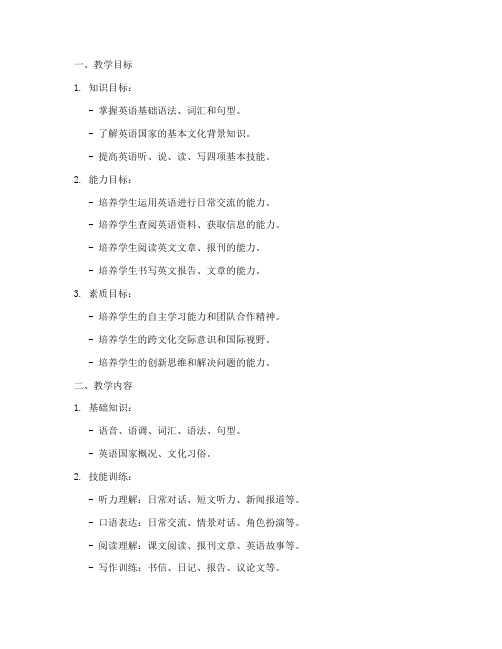
1. 知识目标:- 掌握英语基础语法、词汇和句型。
- 了解英语国家的基本文化背景知识。
- 提高英语听、说、读、写四项基本技能。
2. 能力目标:- 培养学生运用英语进行日常交流的能力。
- 培养学生查阅英语资料、获取信息的能力。
- 培养学生阅读英文文章、报刊的能力。
- 培养学生书写英文报告、文章的能力。
3. 素质目标:- 培养学生的自主学习能力和团队合作精神。
- 培养学生的跨文化交际意识和国际视野。
- 培养学生的创新思维和解决问题的能力。
二、教学内容1. 基础知识:- 语音、语调、词汇、语法、句型。
- 英语国家概况、文化习俗。
2. 技能训练:- 听力理解:日常对话、短文听力、新闻报道等。
- 口语表达:日常交流、情景对话、角色扮演等。
- 阅读理解:课文阅读、报刊文章、英语故事等。
- 写作训练:书信、日记、报告、议论文等。
1. 学时分配:- 总学时:XXX课时。
- 听力:XXX课时。
- 口语:XXX课时。
- 阅读:XXX课时。
- 写作:XXX课时。
2. 教学方法:- 情景教学法:通过模拟真实场景,提高学生的实际应用能力。
- 任务驱动法:通过完成具体任务,激发学生的学习兴趣和积极性。
- 合作学习法:通过小组合作,培养学生的团队协作能力。
- 多媒体教学法:利用多媒体技术,丰富教学内容,提高教学效果。
四、考核方式1. 平时成绩:- 课堂参与:30%- 作业完成情况:20%- 小组活动:10%2. 期末考试:- 听力:20%- 口语:20%- 阅读:30%- 写作:30%五、教材与参考书目- 《高等职业教育英语》系列教材(XXX出版社)2. 参考书目:- 《新编英语教程》系列(XXX出版社)- 《英语国家概况》系列(XXX出版社)- 《英语阅读教程》系列(XXX出版社)六、教学进度安排(根据实际情况填写)七、教学资源1. 多媒体资源:- 英语学习网站、在线课程、英语学习APP等。
2. 教学平台:- 校园网、学习平台、教学管理系统等。
高职高专英语教学大纲

高职高专英语教学大纲第一篇:高职高专英语教学大纲《英语》教学大纲(高职高专版)一、课程的性质﹑目的和任务(一)课程说明课程编号:200700780 学分:8学分总学时:144学时,学时分配:每学期72学时,讲课适用专业:英语开设一年的专科专业(二)课程的性质﹑目的和任务当今世界,以信息技术为主要标志的科技进步日新月异。
社会生活信息化和经济活动全球化使英语日益成为对外开放和与各国交往的重要工具。
学习和掌握英语是对21世纪接受高等职业教育的学生的基本要求之一。
高等职业教育阶段的英语课程应面向现代化,面向世界,面向未来,以培养学生的创新精神和实践能力为重点,全面推进素质教育。
英语教学要使学生了解并尊重其他国家和民族的优秀文化传统,更好地理解并热爱中华民族的优秀文化传统,能适应我国社会、经济、科技发展和国际交流合作的需要。
英语课程应面向全体学生,为高等职业教育各专业培养目标服务并为学生的终身学习打下基础。
二、课程教学基本要求高等职业教育阶段英语课程教学目标是:在初中英语教学的基础上,进一步传授必要的基础知识,强化基本技能训练,培养学生用英语进行人际沟通的能力,有效地开展专门用途英语训练,为学生步入社会打好基础。
学生毕业后应具备职业岗位所需要的一定的听说能力、较强的阅读一般技术资料的能力和书写常用应用文的能力。
1.听(1)能听懂教师用浅近的英语解释生词、课文,听懂根据课文内容提出的问题。
(2)在会话时能听懂对方用比较规范的英语谈论日常生活。
(3)对基本无生词、语速为每分钟120个词左右的听力材料,听一至两遍可理解大意,并能完成相应的练习,准确率达70%。
2.说(1)能就课文内容熟练地进行问答,稍作准备后,能较为准确地复述课文内容。
(2)能运用一些基本词汇展开初步的交际活动。
(3)能运用学过的词汇和句型,介绍本人、家庭、同学、学校以及社会生活的一般情况。
3.读(1)掌握基本阅读技巧,能阅读一般题材的文章。
阅读生词率不超过4%的材料时,阅读速度为每分钟70个词左右,理解正确率达到70%。
高职高专英语课程教学大纲
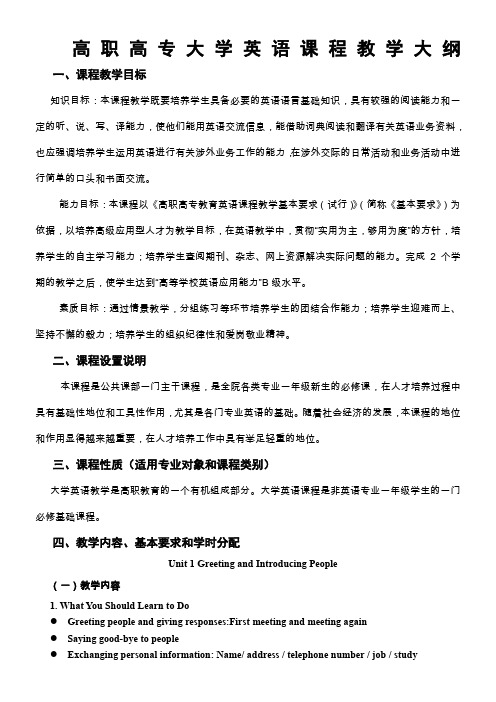
高职高专大学英语课程教学大纲一、课程教学目标知识目标:本课程教学既要培养学生具备必要的英语语言基础知识,具有较强的阅读能力和一定的听、说、写、译能力,使他们能用英语交流信息,能借助词典阅读和翻译有关英语业务资料,也应强调培养学生运用英语进行有关涉外业务工作的能力,在涉外交际的日常活动和业务活动中进行简单的口头和书面交流。
能力目标:本课程以《高职高专教育英语课程教学基本要求(试行)》(简称《基本要求》)为依据,以培养高级应用型人才为教学目标,在英语教学中,贯彻“实用为主,够用为度”的方针,培养学生的自主学习能力;培养学生查阅期刊、杂志、网上资源解决实际问题的能力。
完成2个学期的教学之后,使学生达到“高等学校英语应用能力”B级水平。
素质目标:通过情景教学,分组练习等环节培养学生的团结合作能力;培养学生迎难而上、坚持不懈的毅力;培养学生的组织纪律性和爱岗敬业精神。
二、课程设置说明本课程是公共课部一门主干课程,是全院各类专业一年级新生的必修课,在人才培养过程中具有基础性地位和工具性作用,尤其是各门专业英语的基础。
随着社会经济的发展,本课程的地位和作用显得越来越重要,在人才培养工作中具有举足轻重的地位。
三、课程性质(适用专业对象和课程类别)大学英语教学是高职教育的一个有机组成部分。
大学英语课程是非英语专业一年级学生的一门必修基础课程。
四、教学内容、基本要求和学时分配Unit 1 Greeting and Introducing People(一)教学内容1. What You Should Learn to Do●Greeting people and giving responses:First meeting and meeting again●Saying good-bye to people●Exchanging personal information: Name/ address / telephone number / job / study●Introducing people to each other●Meeting people at the airport●Writing an English business card2. What You Should Know About●How American and British people greet each other●How Chinese people differ in greetings●Basic sentence structures(二)教学基本要求Students get familiar with the topic of greeting and introducing people and develop their ability to greet and introduce people.Unit 2 Giving Thanks and Expressing Regrets(一)教学内容1. What You Should Learn to Do●Expressing pleasure and thanks on receiving a gift or help●Congratulating and responding to congratulations●Expressing regrets and asking for forgiveness●Writing and replying to: a thank-you note / a gift card / a congratulation letter2. What You Should Know About●Gift culture●Cultural differences in expressing thanks and apologies●Use of articles(二)教学基本要求Students get familiar with the topic of giving thanks and expressing regrets and develop their ability to give thanks and express regrets.Unit 3 Directions and Signs(一)教学内容1. What You Should Learn to Do●Ask where a particular place is: in a city / within a building●Showing directions●Talking about means of transport to take●Understanding and writing road and office signs2. What You Should Know About●Different feelings about traveling●Forming of plural nouns(二)教学基本要求Students get familiar with the topic of directions and signs and develop their ability to express directions and signs.Unit 4 Timetables and Schedules(一)教学内容1. What You Should Learn to Do●Making / Keeping / postponing an appointment according to a work timetable●Making reservations according to the timetables of flights and trains●Understanding and making up schedules for different purposes●Writing a timetable / a schedule2. What You Should Know About●Punctuality in social activities●Planning a work day / week●Use of verb tenses(二)教学基本要求Students get familiar with the topic of timetable and schedules and develop their ability to write a timetable and a schedule.Unit 5 Talking About the Weather(一)教学内容1. What You Should Learn to Do●Understanding weather forecast of : global weather conditions / local weather reports●Talking about weather changes: temperature, wind, rain, shower, snow etc.●Talking about the weather to start a conversation●Making comments on weather conditins and showing likes or dislikes●Simulate writing: a weather report2. What You Should Know About●The way weather is forecast●Celsius and Fahrenheit●Use of tenses: simple past and present perfect(二)教学基本要求Students get familiar with the topic of weather and develop their ability to talk about weather.Unit 6 Sports Events and Outdoor Activities(一)教学内容1. What You Should Learn to Do●Understanding and writing a sports event poster●Inviting and going to see a sports event●Talking about and commenting on a sports event●Inviting friends and taking part in outdoor activities●Understanding and designing a sports event poster2. What You Should Know About●Some traditional Chinese sports and activities●Something about Chinese Martial Arts●Use of Contextual Reference of Tenses(二)教学基本要求Students get familiar with the topic of sports events and outdoor activities and develop their ability to invite friends to take part in outdoor activities.Unit 7 Celebrating Holidays and Making Friends(一)教学内容1. What You Should Learn to Do●Talking about giving and going to parties, get-togethers, reunions, etc.●Discussing arrangements and preparations for social activities●Inviting and comign to see exihitions and shows●Understanding and writing notices for social activities2. What You Should Know About●Traditional Western and Chinese holidays and festivals●Traditional customs by which the Chinese celebrate holidays●Use of comparatives of adjectives and adverbs(二)教学基本要求Students get familiar with the topic of holidays and social activities and develop their ability to express holidays and festivals.Unit 8 Keeping Healthy and Seeing a Doctor(一)教学内容1. What You Should Learn to Do●Seeing a doctor: Patient’s complaints●Doctor’s inquiry about symptoms●Doctor’s advice and prescription●Understanding and following doctor’s advice and prescription●Comforting the patient●Understanding and simulate-writing a doctor’s prescription and medical instruction2. What You Should Know About●Medical advances—body organ implantation●Traditional Chinese Medicine●Use of conjunctions(二)教学基本要求Students get familiar with the topic of holidays and social activities and develop their ability to express holidays and festivals.附:课时分配表五、教学手段使用的要求在教学中将现代教学手段与传统教学方法相结合可采用以下教学方法:(1)问题教学法。
高职大学英语课程教学大纲(层次B)样板

高等职业技术学校大学英语B 教学大纲课程编号:0300020适用专业:高职非英语专业制(修)订年月:XXXX年XX月XXXXX 学院XXXX.XXXXXXXX学院大学英语B教学大纲课程编号:0300020适用专业:高职非英语专业修订年月:XXXX年XX月修订人:XXXXX 外语教研室 XXXXX执笔一、课程的性质、任务、在专业中的地位与作用大学英语教学是高等教育的一个有机组成部分,大学英语课程是大学生的一门必修的基础课程。
大学英语B课程是高职三年制大专非英语专业开设的一门公共必修课。
本课程专门供入学时英语有一定基础的学生选择。
旨在为学生建立终身学习英语的基础,培养英语的自学能力和应用能力,同时为学生在校期间或者毕业后参加更高级别的英语等级考试打下一定的语言基础。
通过本课程的学习,使学生达到四川省大学英语二级考试要求:认知2000个英语单词(包括入学时要求掌握的1000个词)以及由这些词构成的常用词组,对其中1500左右的单词能正确拼写,英汉互译,掌握大学英语基本语法和交际用语。
同时,提高学生综合素质,着力打造学生就业的竞争力。
二、课程教学目标与基本教学要求该课程的主要教学目标是:巩固、适当扩充基础知识,掌握良好的语言学习方法,重点培养学生的口语交际能力和专业英语应用能力。
经过学习能顺利通过四川省大学英语二级考试要求。
本课程教学还旨在提高学生英语语言文化素养,增进对英语国家的了解,以适应经济的全球化发展和国家建设的人才培养需要。
(一)口语交际能力培养能听懂简单的对话并能进行简单的口语交际。
1.语音能力要求A.能运用国际音标和基本的拼读规则拼读单词。
B.能较连贯地朗读课文,语音、语调基本正确。
2.听力能力目标要求A.能听懂简单的课堂用语。
B.能听懂没有生词,用浅显的语速较慢的英语讲授的课文内容概要或故事。
C.在会话中,能听懂对方比较规范的英语和略慢于正常语速的简单日常生活话题。
3.口语交际能力训练目标要求A.能运用简单的英语回答课堂上老师的提问。
高职新课标英语大纲

高职新课标英语大纲高职新课标英语大纲旨在培养学生的英语综合应用能力,包括听、说、读、写四个方面。
以下是大纲的主要内容:一、课程目标1. 培养学生的英语交际能力,使其能够在日常生活和工作中使用英语进行基本沟通。
2. 提高学生的英语阅读能力,使其能够理解和分析英语材料。
3. 增强学生的英语写作能力,使其能够撰写简单的英语文章和报告。
4. 发展学生的英语听力理解能力,使其能够听懂英语广播、讲座等。
5. 培养学生的跨文化交际意识,增进对不同文化背景的理解。
二、课程内容1. 基础英语:包括日常会话、基础语法、词汇学习等。
2. 职业英语:针对不同专业领域,如商务英语、旅游英语、技术英语等。
3. 英语听力:通过听力练习,提高学生对英语口语的理解能力。
4. 英语口语:通过角色扮演、小组讨论等形式,提升学生的口语表达能力。
5. 英语阅读:阅读英文报刊、杂志、专业文献等,提高阅读理解能力。
6. 英语写作:学习撰写英语信件、报告、论文等,培养书面表达能力。
三、教学方法1. 采用任务型教学法,通过完成具体的语言任务来学习英语。
2. 利用多媒体教学资源,如视频、音频等,丰富教学内容。
3. 鼓励学生参与课堂讨论,提高其语言表达和思维能力。
4. 定期组织英语角等活动,为学生提供实际使用英语的机会。
四、评估方式1. 形成性评价:包括课堂参与、小组活动、口语表达等。
2. 终结性评价:包括期中和期末考试,测试学生的英语综合能力。
3. 项目作业:要求学生完成特定的英语项目,如撰写报告、制作PPT 等。
五、课程资源1. 教材:选用符合高职英语教学要求的教材。
2. 辅助材料:包括词汇手册、语法指南、听力材料等。
3. 网络资源:利用在线英语学习平台,提供额外的学习支持。
六、课程实施1. 根据学生的英语基础和专业需求,制定个性化的教学计划。
2. 定期对教学效果进行评估,及时调整教学策略。
3. 鼓励学生自主学习,利用课余时间进行英语练习。
通过实施上述高职新课标英语大纲,旨在为学生提供一个全面、系统的英语学习环境,帮助他们提高英语能力,满足未来职场的需求。
高职高专英语语法

高职高专英语语法(总6页)--本页仅作为文档封面,使用时请直接删除即可----内页可以根据需求调整合适字体及大小--《高职高专英语语法》课程教学大纲适用于三年制高职高专英语专业娜日苏一、课程的性质,任务和要求语法课程是英语专业的一门必修课。
本课程共204学时。
考试课。
语法课程的主要任务是:使学生通过本大纲所规定的全部教学内容的学习对语法项目有个全面认识掌握语法的精髓及考点。
学习本课程后应达到下列基本要求:1、使学生了解各项语法内容2、使语法知识系统化3使学生熟练运用语法知识,学语法不能脱离语言的全面实践,要通过实践发展听说读写能力再通过实践加强学生对语法知识的熟练掌握,最终使得语言知识转化为语言能力。
二、课程教学内容绪论1、在内容上,全书为26章介绍了各项语法内容2、本书主要抓住语法的精髓及考点尽量少讲一些琐碎的概念直接切入正题简洁明了地将语法点讲述出来突出了重点,难点,考点。
3、本书分为语法知识同步练习,历年实考题,综合练习三大部分,通过做题即能检测出语法点的不足之处又可以强化巩固所学知识。
第一章名词1、主要内容:名词的概念及分类名词复数形式名词所有格名词的句法作用2、重点:名词分类、名词复数形式、名词所有格3、难点:名词的句法作用4、教学要求:通过本章学习使学生掌握名词的种类、名词所有格、名词复数、名词的句法作用5、习题要求:使学生通过课后同步练习强化巩固所学知识。
6、学时安排:8节第二章代词1、主要内容:代词的概念及分类(人称代词、物主代词、反身代词、指示代词、相互代词、不定代词、疑问代词、连接代词、关系代词)用法2、重点:代词的概念及分类3、难点:用法4、教学要求:通过本章学习使学生掌握代词的分类及用法5、习题要求:使学生通过课后同步练习强化巩固所学知识。
6、学时安排:8节第三章冠词1、主要内容:冠词的基本内容及分类、冠词的用法区别、常用定冠词的情况、常用不定冠词的情况、常用零冠词的情况2、重点:冠词的基本内容及分类3、难点:冠词的用法4、教学要求:通过本章学习使学生掌握冠词基本内容、分类、用法。
职业英语教学大纲(完整版)
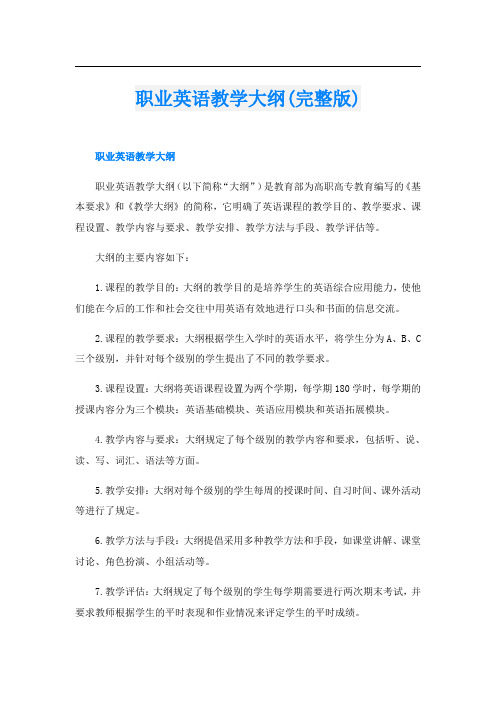
职业英语教学大纲(完整版)职业英语教学大纲职业英语教学大纲(以下简称“大纲”)是教育部为高职高专教育编写的《基本要求》和《教学大纲》的简称,它明确了英语课程的教学目的、教学要求、课程设置、教学内容与要求、教学安排、教学方法与手段、教学评估等。
大纲的主要内容如下:1.课程的教学目的:大纲的教学目的是培养学生的英语综合应用能力,使他们能在今后的工作和社会交往中用英语有效地进行口头和书面的信息交流。
2.课程的教学要求:大纲根据学生入学时的英语水平,将学生分为A、B、C 三个级别,并针对每个级别的学生提出了不同的教学要求。
3.课程设置:大纲将英语课程设置为两个学期,每学期180学时,每学期的授课内容分为三个模块:英语基础模块、英语应用模块和英语拓展模块。
4.教学内容与要求:大纲规定了每个级别的教学内容和要求,包括听、说、读、写、词汇、语法等方面。
5.教学安排:大纲对每个级别的学生每周的授课时间、自习时间、课外活动等进行了规定。
6.教学方法与手段:大纲提倡采用多种教学方法和手段,如课堂讲解、课堂讨论、角色扮演、小组活动等。
7.教学评估:大纲规定了每个级别的学生每学期需要进行两次期末考试,并要求教师根据学生的平时表现和作业情况来评定学生的平时成绩。
总之,职业英语教学大纲是一个比较完整、系统的教学指导文件,它为高职高专英语教学提供了明确的教学目标、科学的教学内容、合理的教学安排和有效的教学方法,对于提高高职高专学生的英语水平具有重要的指导意义。
新职业英语教学大纲要求新职业英语教学大纲是指教育部2009年1月颁布的《高等职业教育英语课程教学要求》,它明确了新形势下的英语教学目标,并提出英语教学分为两个阶段:基础英语阶段和行业英语阶段。
该教学要求明确提出将高职英语教学分为A、B两级。
A级是标准要求,B级是过渡要求。
B级是必过级,即要求所有学生必须达到B级水平,才能获得英语单科毕业证书。
总的来说,新职业英语教学大纲对高职英语教学提出了更高的要求,同时也为英语教学提供了更加明确和全面的指导。
高职高专英语I教学大纲

教学大纲课程代码:2008234课程名称:高职高专英语Ⅰ—Practical EnglishⅠ课程类型:公共基础课学时学分:64学时/ 4学分适用专业:非英语专业专科生开课部门:外语系一、课程的地位、目的和任务课程的地位:《高职高专英语Ⅰ》是为非英语专业专科学生设置的一门公共基础课程。
本课程融英语基础知识与基本技能为一体,具有鲜明的知识性和实践性,是我院各非英语专科专业人才培养方案中的一门重要基础课程。
课程的目的与任务:本课程主要通过向学生传授系统的英语基础语言知识(语音、语法、词汇、篇章等),综合训练语言基本技能(听、说、读、写、译),培养学生综合应用英语的能力,特别是听说能力,使他们在今后的工作和社会交往中能用英语较为有效地进行口头和书面的信息交流,同时增强其自主学习能力、提高综合文化素养,培养学生国际交流的视野。
二、课程与相关课程的联系与分工非英语专业专科学生在本课程开设之前,已经具备一定数量的词汇和语法知识以及一定程度的语言表达能力和语言交际技能,并初步养成了英语思维的习惯。
在此基础上,本课程的开设,旨在继续进一步巩固和丰富学生的语言知识和文化背景知识,提高学生在交际过程中正确运用语言的能力,保证学生听、说、读、写各项技能的均衡发展,进而帮助他们养成更好的学习习惯和思维习惯,进而为后续课程,如各学科专业英语的学习,以及学生科研、深造提供必要的知识储备和能力储备。
三、教学内容与基本要求Lesson 1 College —A Transition Point in My Life1.教学内容1)听力训练:用英语作自我介绍;用英语认识新同学2)语言讲解:词汇学习:assignment, routine, ultimately, hurdle语法讲解:一般现在时和一般过去时的对比3)阅读技巧:把握英语段落的主题句4)应用文写作:英语登记表格的写法2.重点难点重点:1)自我介绍的固定表达2)英语段落的主题句难点:1)记叙文的逻辑思路2)描写心理状态的常用语3.基本要求1)了解中美大一新生的心理状态的异同点;2)掌握课文中出现的语言点及课文核心语法点,把握文章结构,理解文章主题Lesson 2 He Helped the Blind1.教学内容1)听力训练:训练主动提供帮助的常用语,表达帮助别人的意愿的常用语;2)语言讲解:词汇学习:infection, deliver, complicated, simplify语法讲解:现在进行时;3)阅读技巧:识别段落主题句的方法;4)应用文写作:订书单的填写法2.重点难点重点:1)重点词汇和语法讲解;2)识别段落主题句的方法难点:1)主动提供帮助的常见表达2)文章的衔接词3.基本要求1)了解布莱叶盲字体系;2)掌握课文中出现的语言点及课文核心语法点,把握文章结构,理解文章主题Lessons 3 Thanks, Mom, for All You Have Done1.教学内容1)听力训练:表达感激的常用语;2)阅读技巧:识别起衔接作用的信号词;3)应用文写作:申请表格的写法4)语言讲解:词汇学习:elementary, chiding, laundry, bless语法讲解:一般将来时;2.重点难点重点:1)重点词汇和语法讲解;2)表达感激的常用语;难点:1)理解信号词2)文章的主题和语言风格3.基本要求1)了解母亲节的来历;2)掌握课文中出现的语言点及课文核心语法点,把握文章结构,理解文章主题Lessons 4 Run Like the Wind1.教学内容1)听力训练:表达个人兴趣与爱好的常用语;表达喜恶的常用语2)体育英语相关术语3)说明文的一般特征4)语言讲解:词汇学习:sprint, heel, arch, yard, conserve语法讲解:现在完成时与过去完成时;2.重点难点重点:1)重点词汇和语法讲解2)体育英语术语3)英语名片的写法难点:1)用英语表达动作描写2)正确运用表示转折关系的连接词3.基本要求1)了解体育英语;2)掌握课文中出现的语言点及课文核心语法点,把握文章结构,理解文章主题Lessons 5 The Treasure in the Orchard1.教学内容1)听力训练:提出要求的常用英语表达2)阅读技巧:表示因果关系的信号词3)应用文写作:贺卡的写法词汇学习:dishonest, ripen, fetch, furniture, celebrate语法讲解:英语基本句型;2.重点难点重点:1)重点词汇和语法讲解2)故事叙述的技巧;难点:1)词汇搭配2)主题理解;3.基本要求1)了解英语故事的写法;2)掌握课文中出现的语言点及课文核心语法点,把握文章结构,理解文章主题Lesson 6 Tracking Down My Dream1.教学内容1)听力训练:表达自信的常用语2)阅读技巧:识别表示归纳或小结的信号词3)应用文写作:感谢信4)语言讲解:词汇学习:debate, district, attend, dart, limp, humiliate;语法讲解:主谓一致(1);2.重点难点重点:1)重点词汇和语法讲解;2)感谢信的写法;难点:1)主谓一致的运用2)表达自信的常用语;3.基本要求1)了解描写体育动作的英语表达;2)掌握课文中出现的语言点及课文核心语法点,把握文章结构,理解文章主题Lessons7 The Smile1.教学内容1)听力训练:怎样恭维别人,怎样对别人的恭维作出回答2)阅读技巧:寻找文章主题句;3)应用文写作:祝贺信的写法词汇学习:capture, entitle, contemptuous, jailer, nervous;语法讲解:主谓一致(2)2.重点难点重点:1)重点词汇和语法讲解;2)英语故事的写作手法和语言特点;难点:1)祝贺信的写法2)主谓一致特殊用法3.基本要求1)了解文章的写作背景;2)掌握课文中出现的语言点及课文核心语法点,把握文章结构,理解文章主题四、课程学时分配(以章节为单位)1.推荐教材:《21世纪大学实用英语综合教程》;作者:翟象俊,余建中,陈永捷,梁正溜;出版社:复旦大学出版社;出版年月:2009年5月;版次第一版;2.教学参考书:《21世纪大学实用英语教学参考书》(第一册上、下);作者:顾伯清,周明芳;出版社:复旦大学出版社;出版年月:2008年1月;版次第一版。
高职高专英语教学大纲

高职高专英语教学大纲《高职高专英语综合》教学大纲临沂大学外国语学院《高职高专英语》是非英语专业学生的一门极为重要的必修公共基础课程。
它的主要任务是通过课堂教学的各个环节,运用各种教学方法,培养学生的英语综合应用能力,特别是听说能力,使他们在今后工作和社会交往中能用英语有效地进行口头和书面的信息交流;同时增强其自主学习能力、提高综合文化素养,以适应我国经济发展和国际交流的需要。
1、教学对象本大纲的教学对象是高等学校非英语专业的专科生。
入学时,他们应掌握基本的英语语音和语法知识,领会式掌握1800个单词(其中复用式掌握的单词为1200),并在读、听、写、说等方面受过初步的训练。
2、教学目的高职高专英语教学的目的是:培养学生具有较强的阅读能力和一定的听、说、写、译能力,使他们能用英语交流信息。
高职高专英语教学应帮助学生打下扎实的语言基础,掌握良好的语言学习方法,提高文化素养,以适应社会发展和经济建设的需要。
3、教学要求根据学生入学水平的不同,高职高专英语的教学要求分为基本要求和较高要求两种。
1、基本要求1)词汇领会式掌握3400单词(其中复用式掌握的单词为2500),以及由这些构成的常用词组(中学所掌握的单词和词组包括在 13)阅读能力能顺利阅读语言难度中等的一般性题材的文章,掌握中心大意思、以及说明中心大意的事实和细节,并能运行一定的分析、推理和判断,领会作者的观点和态度,阅读速度达到每分钟70词。
在阅读篇幅较长、难度略低、生词不超过总词数3%的材料时,能掌握中心大意,抓住主要事实和有关细节,阅读速度达到每分钟100词。
4)听的能力能听懂英语讲课,并能听懂题材熟悉、句子结构比较简单、基本上没有生词、语速为每分简短会话、谈话、报道和讲座,掌握其中大意,抓住要点和有关细节,领会钟130-150词的讲话者的观点和态度。
5)说的能力能就教材内容和适当的听力材料进行问题和复述,能用英语进行一般的日常会话,能就所熟悉的话题经准备后作简短发言,表达思想比较清楚,语音、语调基本正确。
高职高专英语课程教学大纲
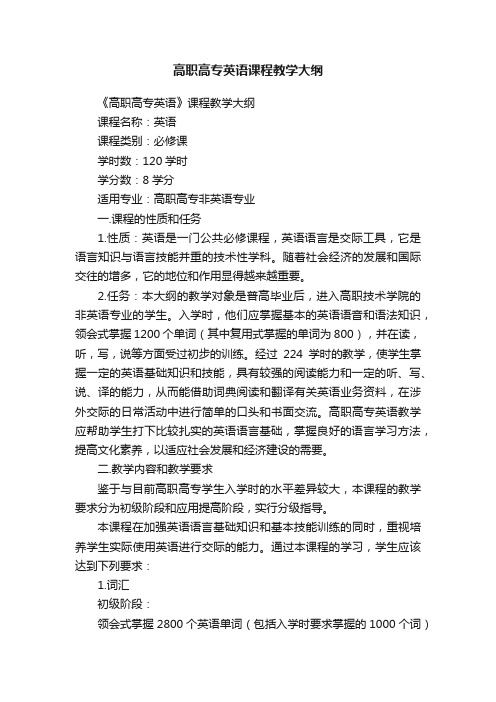
高职高专英语课程教学大纲《高职高专英语》课程教学大纲课程名称:英语课程类别:必修课学时数:120学时学分数:8学分适用专业:高职高专非英语专业一.课程的性质和任务1.性质:英语是一门公共必修课程,英语语言是交际工具,它是语言知识与语言技能并重的技术性学科。
随着社会经济的发展和国际交往的增多,它的地位和作用显得越来越重要。
2.任务:本大纲的教学对象是普高毕业后,进入高职技术学院的非英语专业的学生。
入学时,他们应掌握基本的英语语音和语法知识,领会式掌握1200个单词(其中复用式掌握的单词为800),并在读,听,写,说等方面受过初步的训练。
经过224学时的教学,使学生掌握一定的英语基础知识和技能,具有较强的阅读能力和一定的听、写、说、译的能力,从而能借助词典阅读和翻译有关英语业务资料,在涉外交际的日常活动中进行简单的口头和书面交流。
高职高专英语教学应帮助学生打下比较扎实的英语语言基础,掌握良好的语言学习方法,提高文化素养,以适应社会发展和经济建设的需要。
二.教学内容和教学要求鉴于与目前高职高专学生入学时的水平差异较大,本课程的教学要求分为初级阶段和应用提高阶段,实行分级指导。
本课程在加强英语语言基础知识和基本技能训练的同时,重视培养学生实际使用英语进行交际的能力。
通过本课程的学习,学生应该达到下列要求:1.词汇初级阶段:领会式掌握2800个英语单词(包括入学时要求掌握的1000个词)以及由这些词构成的常用词组,对其中1500个左右的单词能正确拼写、英汉互译。
应用提高阶段:领会式掌握3500个英语单词(包括入学时要求掌握的1200个单词)以及由这些词构成的常用词组(中学所掌握的单词和词组包括在内),并具有按照基本构词法识别生词的能力。
对其中2100个左右的单词能正确拼写,英汉互译。
2.阅读初级阶段:能顺利阅读难度略低于课文的一般题材的简短英文资料,掌握中心大意。
在阅读生词不超过总词数3%的英文资料时,阅读速度不低于每分钟30词。
高职高专英语教学大纲(具体)
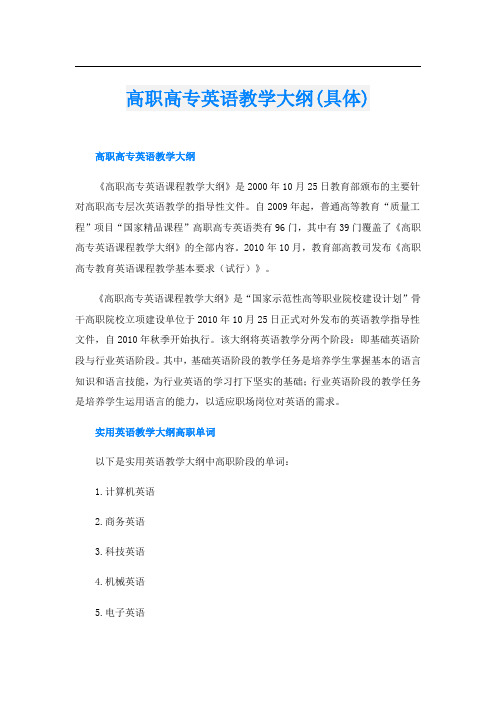
高职高专英语教学大纲(具体)高职高专英语教学大纲《高职高专英语课程教学大纲》是2000年10月25日教育部颁布的主要针对高职高专层次英语教学的指导性文件。
自2009年起,普通高等教育“质量工程”项目“国家精品课程”高职高专英语类有96门,其中有39门覆盖了《高职高专英语课程教学大纲》的全部内容。
2010年10月,教育部高教司发布《高职高专教育英语课程教学基本要求(试行)》。
《高职高专英语课程教学大纲》是“国家示范性高等职业院校建设计划”骨干高职院校立项建设单位于2010年10月25日正式对外发布的英语教学指导性文件,自2010年秋季开始执行。
该大纲将英语教学分两个阶段:即基础英语阶段与行业英语阶段。
其中,基础英语阶段的教学任务是培养学生掌握基本的语言知识和语言技能,为行业英语的学习打下坚实的基础;行业英语阶段的教学任务是培养学生运用语言的能力,以适应职场岗位对英语的需求。
实用英语教学大纲高职单词以下是实用英语教学大纲中高职阶段的单词:1.计算机英语2.商务英语3.科技英语4.机械英语5.电子英语6.建筑英语7.汽车英语8.医学英语9.旅游英语10.法律英语11.体育英语12.音乐英语13.美术英语14.服装英语15.航空英语。
实用英语教学大纲高职版《实用英语教学大纲(高职高专公共英语)》是由刘黛琳和牛津大学高职学院出版部主编的英语,《实用英语教学大纲(高职高专公共英语)》全书共有十个单元,每单元由“学习目标”、“语言知识”、“应用技能”和“自我评估”四大部分组成。
高职英语教学大纲高等职业教育(高等职业学校、高等专科学校)的教育是培养拥护党的基本路线,德、智、体、美等全面发展,具有综合职业能力的高素质、高技能人才。
教学内容要紧贴社会实际需求,充分反映社会经济发展对人才的需求,反映新知识、新技术、新工艺、新方法在生产实践中的应用,反映高等职业教育的特色。
高等职业教育的教学内容应适应经济建设和社会发展的需要,体现职业和职业技能教育的特色,要结合就业面向,合理确定人才的知识能力结构与素质要求,要以应用为主线,坚持够用为度,强化针对性和实用性,基础理论教学以应用为目的,以必需、够用为度,专业课教学要加强针对性和实用性。
职业学校英语教学大纲
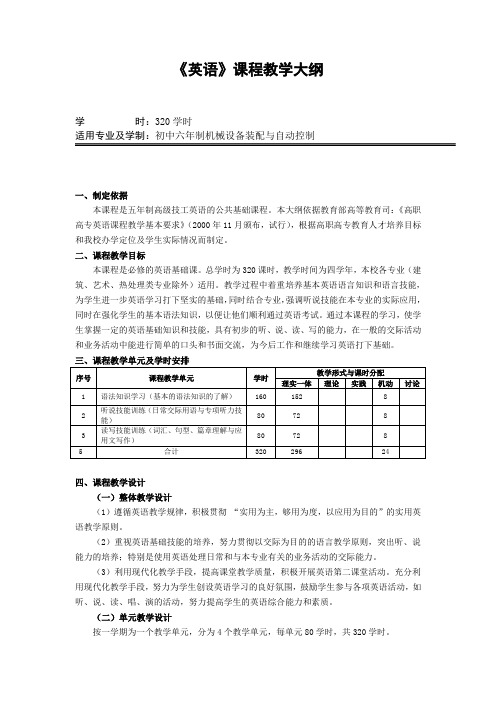
《英语》课程教学大纲学时:320学时适用专业及学制:初中六年制机械设备装配与自动控制一、制定依据本课程是五年制高级技工英语的公共基础课程。
本大纲依据教育部高等教育司:《高职高专英语课程教学基本要求》(2000年11月颁布,试行),根据高职高专教育人才培养目标和我校办学定位及学生实际情况而制定。
二、课程教学目标本课程是必修的英语基础课。
总学时为320课时,教学时间为四学年,本校各专业(建筑、艺术、热处理类专业除外)适用。
教学过程中着重培养基本英语语言知识和语言技能,为学生进一步英语学习打下坚实的基础,同时结合专业,强调听说技能在本专业的实际应用,同时在强化学生的基本语法知识,以便让他们顺利通过英语考试。
通过本课程的学习,使学生掌握一定的英语基础知识和技能,具有初步的听、说、读、写的能力,在一般的交际活动和业务活动中能进行简单的口头和书面交流,为今后工作和继续学习英语打下基础。
三、课程教学单元及学时安排四、课程教学设计(一)整体教学设计(1)遵循英语教学规律,积极贯彻“实用为主,够用为度,以应用为目的”的实用英语教学原则。
(2)重视英语基础技能的培养,努力贯彻以交际为目的的语言教学原则,突出听、说能力的培养;特别是使用英语处理日常和与本专业有关的业务活动的交际能力。
(3)利用现代化教学手段,提高课堂教学质量,积极开展英语第二课堂活动。
充分利用现代化教学手段,努力为学生创设英语学习的良好氛围,鼓励学生参与各项英语活动,如听、说、读、唱、演的活动,努力提高学生的英语综合能力和素质。
(二)单元教学设计按一学期为一个教学单元,分为4个教学单元,每单元80学时,共320学时。
第一二单元:本单元教学主要以语法补习为主,强化学生的英语基础知识及技能。
第三单元:本单元教学主要以日常交际用语与专项听力练习为主。
第四单元:本单元教学主要以读写技能为主,强化学生的阅读能力及理解力。
五、建议授课计划六、课程教学实施条件1.师资要求①从事本课程教学的教师,应具备以下相关知识、能力和资质:◆获得高校教师资格证(专任教师);◆熟悉《高职高专英语课程教学基本要求》及《成考英语》②本课程师资由专、兼职教师共同组成。
- 1、下载文档前请自行甄别文档内容的完整性,平台不提供额外的编辑、内容补充、找答案等附加服务。
- 2、"仅部分预览"的文档,不可在线预览部分如存在完整性等问题,可反馈申请退款(可完整预览的文档不适用该条件!)。
- 3、如文档侵犯您的权益,请联系客服反馈,我们会尽快为您处理(人工客服工作时间:9:00-18:30)。
矿产资源开发利用方案编写内容要求及审查大纲
矿产资源开发利用方案编写内容要求及《矿产资源开发利用方案》审查大纲一、概述
㈠矿区位置、隶属关系和企业性质。
如为改扩建矿山, 应说明矿山现状、
特点及存在的主要问题。
㈡编制依据
(1简述项目前期工作进展情况及与有关方面对项目的意向性协议情况。
(2 列出开发利用方案编制所依据的主要基础性资料的名称。
如经储量管理部门认定的矿区地质勘探报告、选矿试验报告、加工利用试验报告、工程地质初评资料、矿区水文资料和供水资料等。
对改、扩建矿山应有生产实际资料, 如矿山总平面现状图、矿床开拓系统图、采场现状图和主要采选设备清单等。
二、矿产品需求现状和预测
㈠该矿产在国内需求情况和市场供应情况
1、矿产品现状及加工利用趋向。
2、国内近、远期的需求量及主要销向预测。
㈡产品价格分析
1、国内矿产品价格现状。
2、矿产品价格稳定性及变化趋势。
三、矿产资源概况
㈠矿区总体概况
1、矿区总体规划情况。
2、矿区矿产资源概况。
3、该设计与矿区总体开发的关系。
㈡该设计项目的资源概况
1、矿床地质及构造特征。
2、矿床开采技术条件及水文地质条件。
